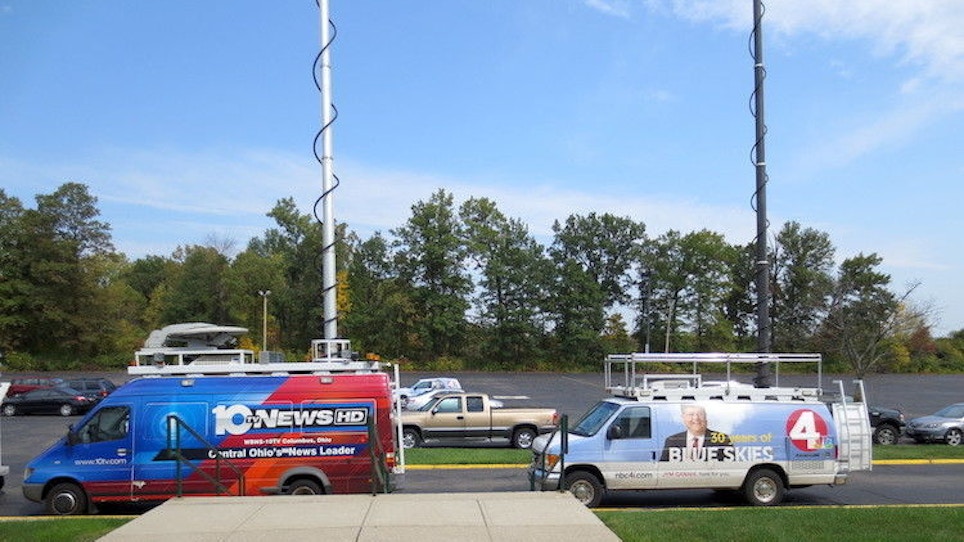
News media outlets don't know everything that's going on in the coverage area. Learn who is the news director or newsroom manager, contact them to explain what you're hosting, and invite them to your event — especially if it involves presentations to law enforcement or military units or members.(Photo: Michael D. Faw)
Planning and having the perfect in-store event can help lure new customers through the threshold, entice current customers to return and increase sales while dramatically raising awareness of your store in the community and surrounding region. Events can bring benefits and profits. Are you ready to hold an over-the-top event?
Your shop or retail site probably follows the procedures used by businesses around the globe — open the doors and hopefully have customers trickle in. Once inside your store, those wandering customers waffle about, grasp anything that catches their attention and they handle a lot of gear and gadgets in the process. Sometimes they ask questions of you or your staff and maybe they make a purchase or simply leave empty handed. You can break that standard slow shopper streak with an event.
Much like when the circus clowns and ear-flopping elephants come marching down Main Street and into town, or NASA has a count-down for a rocket launch (ok, maybe not at that magnitude), events draw folks in and get them excited. Planning and having the perfect in-store event (or a large scale one that overflows onto the sidewalk and into your parking lot) can help lure new customers to your aisles and improve your bottom line.
Most successful events have a purpose or goal, such as increasing the local shooting enthusiast base, possibly selling a specific type of firearm or brand or to move a specific category of merchandise. Numerous gun clubs and shooting ranges offer rifle sight–in days a month or weeks before the opening of deer season. These types of events, especially if open to the public in a private membership club, are goodwill and community service programs. Some ranges hold events for veterans on specific holidays, or other types of events that honor law enforcement and emergency responders. Be creative and be specific in the customer base the event will focus on. Work to develop a precise and important message: Why everyone should come to the event.
Another goal that can be written, or unwritten, is to increase profits. While making money is a great goal, you’ll need to go into the details to determine the when, where and how to get those dollars. Like all business areas, you’ll need to set goals, determine steps to reach those goals, lay out a timeline, decide on a budget and determine the needed resources. Successful events take planning and effort — but can reap huge rewards. These efforts can also increase goodwill for your business.

Plan Far Ahead
The first major step to take when planning any event is selecting the site. Be honest as you ask yourself and your employees how much space you have to showcase gear and products, accommodate any invited vendors or seminar speakers and to help customers learn about your wares.
While the back of aisles, and that open front entrance area can be used, some shops take it to the street and place gear on the sidewalk or parking lot. If you expand into those areas, there are logistical concerns such as security, shoplifting and having enough employees on hand to help customers. In some locations, you may need special permits from the city or highway department to utilize a sidewalk or make sales outside the walls of your shop.
If your business is in a strip mall, see if there are open stores in the building and if you can rent this space for the day(s) of your event. I have been in a few retailer shops that did this; it worked wonderfully for them and provided uncrowded space for customers to see and shop.
Since the vacant store front was nearby, it made moving gear to that site easy, security was as simple as locking the doors and customers could be easily pointed to the nearby event location. The main store served customers and moved merchandise and the rented temporary space made merchandising easy.
Next, if you have cleared the space hurdle, it’s time to zero in on the best days to schedule your event. You could be wasting your time offering a huge sale on 3-gun gear in September or October, because the season is winding down or finished. Those items would move better in early spring — timing is everything with events. Look at the calendar, look at your location and region and then look at your options. If a big event such as the state fair or veteran’s parade brings lots of visitors to your town, or even better, to your street, take advantage of those new potential customers passing by the door.
Yes, Black Friday sales are popular with some retailers and shoppers, but remember on that day and weekend, you are competing with many more businesses. Also remember school breaks and sporting events, including out-of-town football games, and also the Super Bowl. Check your calendar for holidays, such as Memorial Day or Labor Day, that can bring customers in or lead them out of town.
Check with the local Chamber of Commerce for occupancy numbers in hotels to determine draws and major vacancy periods. Those numbers could help you decide when to hold an event. Note non-standard holidays such as student breaks from schools. Even in mega cities such as Portland, when there is a spring or fall break for school students, a large segment of the population leaves town. State and federal holidays, religious events, local bazaars and community fairs can all pull — or push — potential customers. Look at the calendar or back issues of newspapers in the library for the dates you are considering.
Next, focus on stocking up for the event. Will your supply channels be able to provide the goods for your sale or event? How far ahead do you need to plan and what are the terms? Ask manufacturer representatives for details and possible assistance during your event. You could also ask for pointers on other events they know about and what they thought was successful there.
Event planning has many levels and requires many details. The best method to ensure a success is to make a check list. Even better is to create a spread sheet and include a time line and other details.
Before The Door Opens
The day and hours before the event — whether you decide on a mega sale or a simple product demo day — is the time to recheck your checklist. If you are already short staffed and think an event will overwhelm your staff, consider hiring part-time employees (allow time to train them) and maybe consider hiring a professional to manage and plan your event.
To host an event that runs smoothly, get ahead of the details and requirements. In most cases, you’ll need to be fully engaged to the event about six months before the big day. And staffing and employees need to be engaged as well. Organize a team, you can’t do it all, even in a small shop event or in a multi-display mid-size store.
For the best marketing efforts, brand your event with a catchy name or easy-to-understand statement. You can also create a logo, and an ideal one would be an enhancement or addition to the one you regularly use. Build on the brand that customers recognize and are drawn to. In most cases, you have to spend money to make money. Develop a budget to stay on track.
While it is easy to get a, “Yes, I’m coming to the XYZ event,” from your customers, having them pre-register makes them more committed and more likely to be present. If you are having special education seminars or plan to pass out expensive gifts or door prizes, consider charging a fee to enter or attend.
Another way to earn a more solid commitment is to have customers and possible attendees sign up or register online. That can be a great way to capture contact information and find a select base for a pre-sale or if having a pre-event event. You’ve seen the long lines and even camping out to be among the first to get a new cellphone and those companies put a lot of emphasis on being among the first. You can do the same with a segment of your customer base with proper planning and promotion.
Successful events also need to be properly promoted. Create a publicity plan, including inviting the local newspapers and TV stations. Some stores have used ribbon cutting ceremonies and others have issued next-numbers to control long lines of shoppers. The more hype and anticipation, the more the crowds grow and the cash registers ring. It’s a fact that people like food and need places to sit. Plan to cover and provide those necessities. If you must, contracting with a food truck seems to be a route many retailers take.
Winding Down
After the event closes, part of the most successful events includes thank you notes for those who helped add to the success. Remember to thank media and news outlets that may have covered the event.
Once the doors close, your event is definitely NOT over. After the dust settles and the big day ends, take time to evaluate and take notes on what worked, what could have been better, any issues or bottlenecks, top sellers and overheard comments. Those clues can help guide you for future events, especially if you are thinking about making it an annual event.
Events take time and effort to be successful, but a big part of that success is sales and the resulting income. That’s always a plus on any bottom line.





